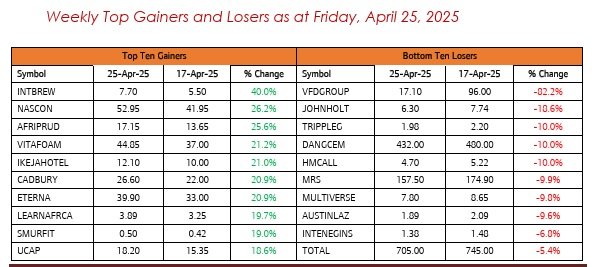Welcome to this week’s Economic Intelligence Report. We break down key global and Nigerian economic events, financial markets performance, and money market updates—especially helpful if you’re watching the economy or planning to invest. Let’s dive in.
This week’s economic report covers key developments in both the global and Nigerian markets. Internationally, the IMF revised its global growth forecast downward due to rising trade tensions, stubborn inflation, and geopolitical risks.
The United States and China are locked in a fresh trade war, disrupting global trade flows and slowing investment.
Inflation remains sticky, especially in advanced economies, creating uncertainty for central banks and investors.
Sub-Saharan Africa, including Nigeria, faces moderate growth but remains vulnerable to global shocks. On the domestic front, the Nigerian equities market posted strong gains, driven by positive earnings releases and renewed investor confidence.
Financial stocks and consumer goods led the rally, even as oil and industrial goods stocks weakened. We also cover Nigeria’s money market updates, including treasury bills and bond rates for those planning smart investments.
International Economic Update
The International Monetary Fund (IMF) cut its global growth forecast for 2025 to “2.8%,” down from “3.3% in 2024.” This is the slowest since 2020.
The IMF blames “trade tensions, stubborn inflation, and global uncertainty.” Trade wars between the U.S. and China have worsened. President Trump’s 115% tariffs on Chinese goods were met by China’s 146% counter-tariffs.
This trade standoff has hurt cross-border investment and lowered business confidence. Global trade volume growth was cut to “1.7% in 2025.” That’s bad news for export-driven economies like Nigeria.
Inflation is not easing as fast as expected. In the U.S., it may stay at “around 4% in 2025.” This is tied to high tariffs and rising costs. Global central banks are finding it harder to balance growth and inflation.

Regional forecasts are uneven. The U.S. is projected to grow “by 1.8%,” China “by 4%,” and Eurozone growth will slow, especially in Germany. Emerging markets may see “3.7% growth,” with Sub-Saharan Africa at “3.8%.”
Nigeria’s growth is forecast at “3%” in 2025, while South Africa’s is “1%.” These figures are still shaky, thanks to weak fiscal positions and inflation at home.
The IMF warned of “downside risks.” It noted that a prolonged trade war or sudden investor panic could deepen the slowdown.
Nigeria’s Equities Market Update
Despite a holiday-shortened week, Nigerian stocks kept gaining. The Nigerian Exchange (NGX) All-Share Index rose “1.46%,” closing at “105,752.61 points.” Market capitalisation climbed to ₦66.47 trillion, adding ₦965.69 billion.
Investor interest was strong in financial and consumer goods sectors. The listing of Legend Internet Plc, with 2 billion shares, added ₦11.28 billion to the market.
Year-to-date returns improved to “2.75%.” Market breadth was solid—63 stocks gained while 27 lost, giving a 2.33x ratio. Volume and turnover also rose, by “21.61%” and “30.27%” respectively.
Sectors performed well:
- NGX Consumer Goods Index gained “8.57%,” led by INTERBREW, NASCON, and Cadbury.
- NGX Insurance rose “7.30%,” thanks to NEM, Lasaco, and Cornerstone.
- NGX Banking climbed “5.06%,” boosted by JAIZ, Access Corp, and ETI.

However, NGX Oil & Gas and Industrial Goods dropped “0.07%” and “3.43%” due to weak sentiment around MRS Oil, Total Nigeria, and Dangote Cement.
Top gainers this week:
- INTERBREW: +40%
- NASCON: +26.2%
- AFRIPRUD: +25.6%
- VITAFOAM: +21.2%
- IKEJAHOTEL: +21%
Worst performers:
- VFDGROUP: -82.2%
- JOHNHOLT: -18.6%
- TRIPPLE GEE, DANGOTE CEMENT, HALDANE MCCALL: -10% each
Money Market Update
The money market saw steady interest, especially among risk-averse investors looking for safe returns.

Treasury Bills:
Rates remained mostly stable. The 91-day, 182-day, and 364-day T-bills posted average yields of “6.5%,” “10.2%,” and “15.3%” respectively. Demand for short-term bills was healthy, driven by liquidity and investor preference for less risky instruments.
Bonds:
Yields on Nigerian sovereign bonds ticked slightly higher this week. The 10-year FGN bond yield hovered around “17.1%.” The uptick was linked to inflation fears and cautious investor sentiment around government debt.
Open Market Operations (OMO):
OMO bills remained attractive to institutional investors. CBN maintained firm liquidity control, selling short-dated instruments with yields between “15% to 17.5%.”
CBN Policy Outlook:
The Central Bank is likely to maintain a tight stance to check inflation and stabilise the naira. However, growing pressure on FX reserves and rising government borrowing needs could shift the tone in the weeks ahead.
If you’re thinking of investing, T-bills and medium-term bonds offer safer returns now. But watch inflation and any surprise CBN decisions.
Forecast and Conclusion
Global risks remain high. The IMF wants governments to “restore a stable trade environment” and “promote inclusive growth.”
In Nigeria, strong Q1 earnings and dividends could keep market sentiment positive in the short term. But don’t expect a smooth ride. Profit-taking and economic worries could slow things down.
Focus on quality stocks and instruments with solid fundamentals.
Like 👍, Comment, share this article, and Follow us on our social media handles.








The Investor should Wait, watch and then make the move. On the other way round, there are people still thriving during economic downtime and rising inflation. Investing is always risky, it is your risk tolerance that matters.